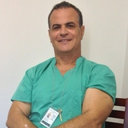Anti-Inflammatory Treatment With Colchicine in Acute Myocardial Infarction: A Pilot Study.
Keywords
Abstract
BACKGROUND
Inflammatory processes have been identified as key mediators of the deleterious effects of ischemia/reperfusion in ST-segment-elevation myocardial infarction. Colchicine is a substance with potent anti-inflammatory properties, suitable for safe use in patients with cardiovascular disease. The purpose of this study was to test the hypothesis that a short course of colchicine treatment could lead to reduced infarct size.
RESULTS
Patients presenting with ST-segment-elevation myocardial infarction ≤12 hours from pain onset (treated with primary percutaneous coronary intervention) were randomly assigned to colchicine or placebo for 5 days. The primary outcome parameter was the area under the curve of creatine kinase-myocardial brain fraction concentration. A subset of patients underwent cardiac MRI with late gadolinium enhancement 6 to 9 days after the index ST-segment-elevation myocardial infarction. One hundred fifty-one patients were included (60 in the MRI substudy). The area under the creatine kinase-myocardial brain fraction curve was 3144 (interquartile range [IQR], 1754-6940) ng·h(-1)·mL(-1) in the colchicine group in comparison with 6184 (IQR, 4456-6980) ng·h(-1)·mL(-1) in controls (P<0.001). Indexed MRI-late gadolinium enhancement-defined infarct size was 18.3 (IQR, 7.6-29.9) mL/1.73 m(2) in the colchicine group versus 23.2 (18.5-33.4) mL/1.73 m(2) in controls (P=0.019). The relative infarct size (as a proportion to left ventricular myocardial volume) was 13.0 (IQR, 8.0-25.3) % and 19.8 (IQR, 13.7-29.8) %, respectively (P=0.034).
CONCLUSIONS
These results suggest a potential benefit of colchicine in ST-segment-elevation myocardial infarction, but further clinical trials are necessary to draw secure conclusions, especially considering the fact that the present study was not powered to assess clinical end points.
BACKGROUND
URL: http://www.clinicaltrials.gov. Unique identifier: NCT01936285.



